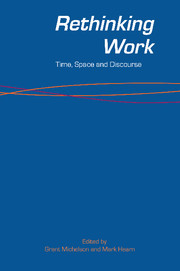Book contents
- Frontmatter
- Contents
- Tables and Figure
- Contributors
- Editorial Statement
- Abbreviations
- 1 Going to a New Place
- PART I TIME
- PART II SPACE
- PART III DISCOURSE
- 11 The National Narrative of Work
- 12 Shareholder Value and Corporate Social Responsibility in Work Organisations
- 13 Rethinking HRM
- 14 Identifying the Subject
- 15 Constructing Older Workers
- COMMENTARY
- Index
13 - Rethinking HRM
Contemporary Practitioner Discourse and the Tensions between Ethics and Business Partnership
Published online by Cambridge University Press: 05 June 2012
- Frontmatter
- Contents
- Tables and Figure
- Contributors
- Editorial Statement
- Abbreviations
- 1 Going to a New Place
- PART I TIME
- PART II SPACE
- PART III DISCOURSE
- 11 The National Narrative of Work
- 12 Shareholder Value and Corporate Social Responsibility in Work Organisations
- 13 Rethinking HRM
- 14 Identifying the Subject
- 15 Constructing Older Workers
- COMMENTARY
- Index
Summary
As a field of scholarship and practice, human resource management or HRM appears to be almost constantly in a state of crisis, tension and anxiety. This may reflect both the uncertainty and relative immaturity of HRM as a distinct area of academic research and theory, as well as its practical concern with a site of significant change and volatility in recent decades – the management of work and workers in the contemporary organisation. For some time a fundamental tension has been recognised between HRM's traditional concern with employee welfare and advocacy and its more recent concern with being an effective ‘business partner’ (Beer 1997; Storey 2001). In academic work this is evident in longstanding debates around ‘soft’ and ‘hard’ versions of HRM (Legge 1995a) and in the recent interest in the ethical and moral dilemmas confronted by human resources managers asked to manage the consequences of downsizing, delayering, work intensification and workplace change in organisations that purport to be high-performance workplaces (Sisson 1994). Recent academic research has suggested ways of reconciling or at least managing these tensions. To a greater or lesser extent these contributions have called for HRM to recover its lost tradition of concern for employee advocacy by paying renewed attention to ethics, values and the rights and entitlements of employees.
As a way of rethinking HRM, the renewed contemporary academic interest in ethics is reconsidered in this chapter in the context of the tension between the business partnership and employee advocacy roles implicit in strategic HRM theory and practice.
- Type
- Chapter
- Information
- Rethinking WorkTime, Space and Discourse, pp. 263 - 284Publisher: Cambridge University PressPrint publication year: 2006



